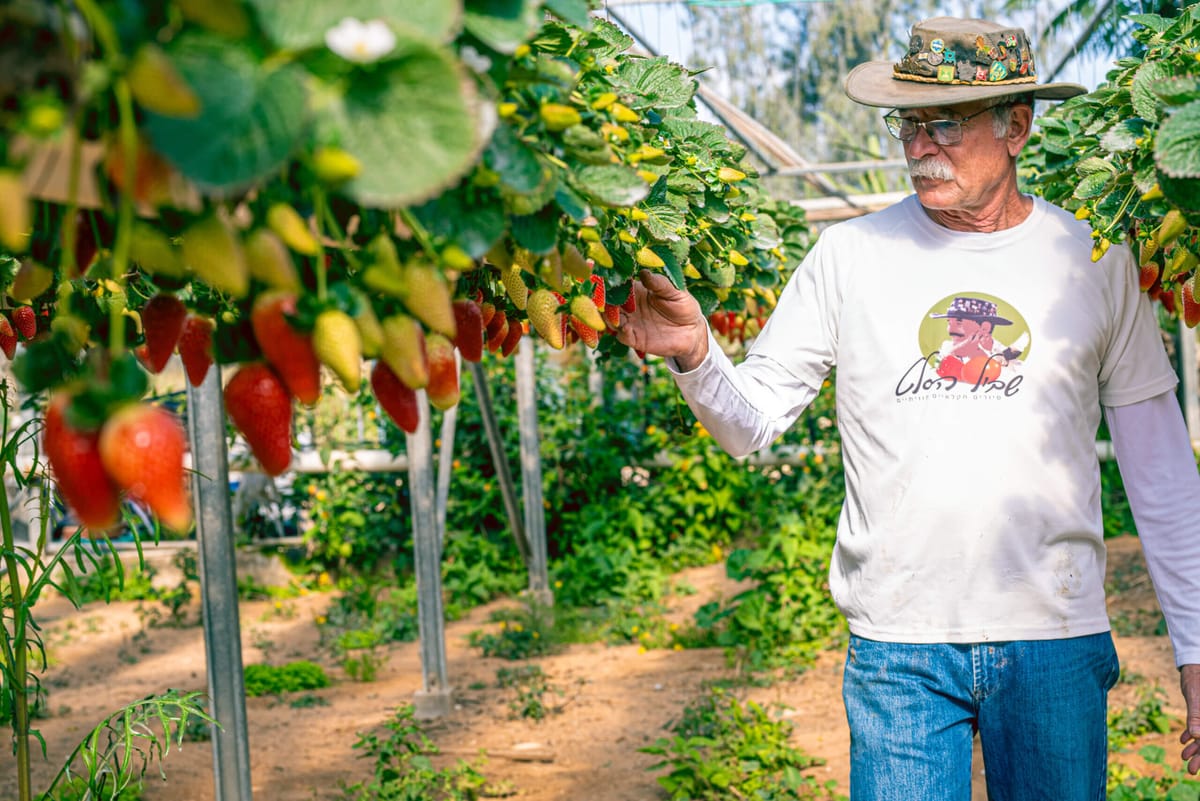Israel now has its own Strawberry Fields -- to honor a hostage whose body was just recovered in Gaza

Source: The Forward
Author: Ilene Prusher
TALMEI YOSEF, Israel - For some Israelis, awaiting news of the remaining hostages in Gaza is nightmarishly personal. Is a child, sibling, spouse or parent still alive?
Uri Alon is not related to his missing person. Michel Nisenbaum was his employee -- but much more than that, he explained to me on my visit to his farm near Gaza last week.
Since Oct. 7, Alon and his wife Shuli had prayed that their friend -- the charming guide who explained their agricultural enterprise to visitors from around the world -- had survived captivity.
On Friday they found out that he had not. Nisenbaum's was one of three whose bodies were discovered last week by the Israel Defense Forces at the bottom of a shaft under a house in northern Gaza. Hundreds came to his funeral Sunday in Ashkelon, along Israel's coast.
"We dreamed about a different end," Alon said. "But deep in our hearts, we started to realize that there wasn't a good chance."
The Salad Trail, the farm where Nisenbaum worked -- a showcase for farming techniques that, as Israelis like to boast, make the desert bloom -- lies about three miles from Gaza. But on the morning that Hamas militants crossed the border and attacked Israel, Nisenbaum was in his home in nearby Sderot.
Early that day, his phone rang.
It was his daughter, distraught. Her husband had brought their daughter Mika, 4, with him to work on the Re'im military base, which she said was under attack.
And so Nisenbaum, a fit 59-year-old who immigrated to Israel from Brazil when he was 13, rushed to rescue his granddaughter. He passed ambushed cars on the road and was most likely told to go back because there were terrorists roaming the area, Alon said. Nisenbaum drove on, but never made it to the base.
Terrorists shot him and dragged his dead body into Gaza.
At the base, his son-in-law pushed his daughter under a desk, covered her with a bulletproof vest and shot at terrorists through a window. Both father and daughter survived.
Investigators found Nisenbaum's Salad Trail uniform near his burned out car, and called on Alon to find out more about the man who had worn it.
About 110 of the original 252 people kidnapped on Oct. 7 have since been freed. Nisenbaum had Crohn's disease, and needed regular treatments at the hospital. Alon said he had hoped that would put him on the priority list as Israel negotiated for the hostages' release.
There were no hopeful signs.
"No one reported seeing him in captivity," Alon said. "Time went by and we didn't hear a word about him."
Alon hired Nisenbaum even though he was trained in computer science and knew practically nothing about farming.
"Everyone fell in love with him. I taught him about agriculture, but he learned it all very quickly and makes such good connections with all our customers," Alon said, often still referring to Nisenbaum in the present tense. "He has an excellent sense of humor."
The Salad Trail used to be a commercial farm. Alon was drawn to the land 36 years ago with a promise from the government that it would be free, and by the challenge of soil so arid it would seem to grow nothing more than cactus fruit.
He turned it into a demonstration farm. Alon and his guides now show tourists -- from Bedouin school kids to the South Americans Nisenbaum spoke to in their native Portuguese and Spanish -- the 70 varieties of crops they grow despite the climate.
When Nisenbaum wasn't guiding here, he hiked on the Israel National Trail and also volunteered with Magen David Adom, the ambulance service.
Only after Nisenbaum's body was identified last week did Alon learn the truth -- that he was dead before he was taken to Gaza, abducted as a bargaining chip when Hamas negotiates for the release of Palestinians from Israeli prisons.
At her father's funeral on Sunday, Nisenbaum's daughter Chen Machluf spoke about his heroism.
"The children will grow up and remember what a heroic grandfather you were, who was not afraid of the terrorists and saved people on the way," she said, according to The Times of Israel. "Thanks to you, they are here. I love and miss you. Now you are home."
Alon said he can also speak to his friend's bravery: "The last thing he did was precisely Michel Nisenbaum: Someone asked for help and he jumped to do it."
He will honor Nisenbaum by renaming the farm's popular strawberry fields "Strawberry Fields for Michel." Visitors will sample fruit -- gratis -- in Nisenbaum's honor.
Alon and his wife still come a few days a week to keep the farm going. But with the war keeping tourists away, he said his income is about 5% of what it was before Oct. 7.
"They beat us on that day, but they didn't win, Alon said.
"We want to keep showing the world how we can grow food in desert conditions - that we can make flowers grow from this soil, not rockets."



